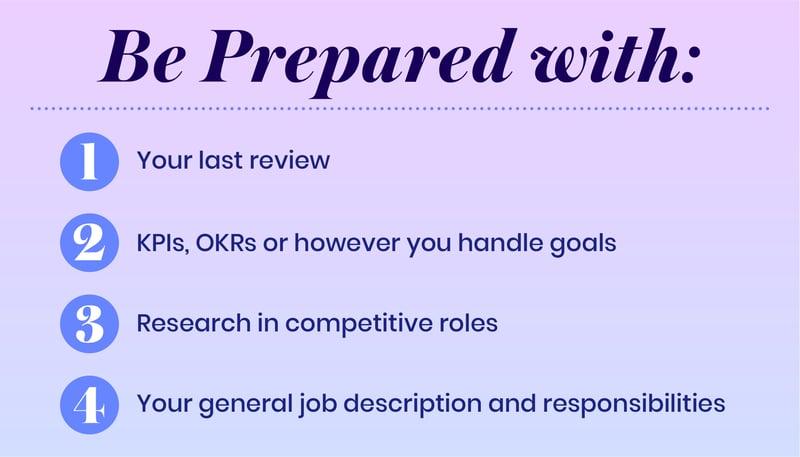Sitting down for your review with your boss has the potential to be intimidating. You often have to be prepared to talk about your goals, listen to constructive criticism and perhaps even point out your own failures since your last review so that you can find ways to learn from them. However, a productive review is incredibly beneficial for your career growth.
Taking the time to mindfully prepare for your review will help you go into the meeting with confidence and an agenda. This means that instead of sitting there nervously while your supervisor has complete control over the discussion, you can be actively engaged and even steer the conversation towards the topics that you’d like to talk about as well.
👉 Be actively engaged in this discussion so you can steer the conversation toward topics important to your growth.
One of the best ways to advance your career is by speaking up and advocating for yourself, and the best place to start is during a meeting that is already structured to review your performance and accomplishments.
Prep work
Ideally, you should start preparing for your review basically as soon as you walk out of your last one by keeping track of your goals and accomplishments on a regular basis. This method allows you to gather as much data as possible before you meet with your supervisor. However, if you weren’t able to get started that soon, any prep is better than none, so there is still plenty you can do.

General preparation
- Dust off your most recent review. This is what will be the baseline for your review this time around. So, familiarize yourself with what you discussed, the goals you set, where you needed to improve and any initiatives your boss said they’d help with. This is going to be the bulk of your supervisor’s agenda, so you want to come to the review with examples that show you’ve been working on those areas of improvement, you’ve progressed in reaching (or have reached) your goals and how you’ve taken on more work to align with your new initiatives.
- Brush up on your key performance indicators (KPIs). Depending on your organization or your boss, KPIs may be something that’s always looming overhead that you’re constantly tracking, or they simply serve as a guidepost to help you stay focused. If they aren’t ever-present, then you’ll want to look them over again to make sure you have been reaching them since your last review. Even better, you may find that you’ve been exceeding them. Whatever the case, have that data ready to bring with you to your meeting.
- Refresh your memory of your job description. This is especially important if you plan to advocate for a raise or promotion during the meeting because you can compare your day-to-day work to this description to help demonstrate why you deserve to move ahead. Even if you’re not going into the meeting with this goal, this is still important to do because you might find that you’re doing far more than is asked of you, in which case you should be compensated for it, or you may find there are aspects to the job that you haven’t been introduced to yet and that you’d like to be doing.
- Do some salary research. This is another task that is essential if you’re going into the meeting with a plan to ask for a raise. However, it’s also important to know in general, because you might find you’re being significantly underpaid for your job. Make sure you gather credible data to present during your review that will help back your argument up.
Goal progress and planning
Goals are typically a pillar in reviews, so you will want to look over your most previous goals as well as put some real thought into the new goals you will set. You definitely want to come to the meeting prepared for this discussion.
- Provide evidence of any goals you feel like you’ve met. Maybe this is easy because it involved a hard skill, but if it was a soft skill like “speak up more in large meetings,” you’ll need to come up with examples of how you’ve done this and where your comfort level is now compared to when you set the goal.
- Discuss the progress you’ve made on any ongoing goals. If you didn’t accomplish one of your previously set goals, that’s okay, but come to the meeting with ideas for how you plan to progress further or even achieve them. While your supervisor may be open to brainstorming through this with you, don’t expect them to and plan accordingly.
- Present new, well-thought-out goals. It’s tempting to just write down some vague goals on your pre-review sheet, but try not to do that. Come up with things you think will help you advance your career in the direction you’d like to go. Then, come to the meeting ready to discuss them and how you plan to move forward.
Create an agenda
Think of what you want to discuss during your meeting and write them down. Remember there are a lot of talking points that are already baked into the general format of the meeting, like your overall performance, how you’ve improved and areas that could use more improvement. Some conversations you may have to initiate include a promotion, raise and team dynamics. There might be a lot of things you want to go over with your supervisor, but make sure your review is the appropriate setting for them when you’re creating your agenda.
Once you have your list narrowed down, make a copy to bring with you during the review so that you are sure you hit every point. You might even want to send it to your boss in the days leading up to the review so that they can ensure they have set aside enough time to cover everything.
In the review
Showing up to your review prepared and with data will already help you ensure the meeting is productive, but you can go a step further by steering the conversation and by asking questions.
Example questions to ask:
❓Do you have any constructive feedback that will help me achieve my goals?
❓What are some soft skills that you think I could improve upon? Do you have any guidance in practicing them?
❓If you were to set a goal for me between now and my next review, what would it be?
❓Are there any upcoming projects or initiatives within the department or organization that you think I’d be a good fit for?
❓What do you think is a realistic timeline for a promotion and/or raise?
Possible discussion points
📣 Share your ideas for progressing the department’s goals (keep this positive and don’t discuss individuals)
📣 Long term goals you have within the organization
📣 Tools you could use to make you/the team more efficient
📣 Organization-wide changes in direction, mission, etc. and how you fit into them
📣 Suggestions for boosting morale, based on what works for you
Next steps
You made it through your review! Now that that weight has been lifted, give yourself a minute to reflect and recognize the hard work you put into the meeting. Then, start preparing for the next one (yes, already). Create a document where you can track specific accomplishments, your failures and how you learned from them, any feedback you get in the meantime and anything else that pops up that could be beneficial in the future. Just think of all of the ways you can advocate for yourself, and your career, all over again next time with a little preparedness.
Find success in working motherhood
Moms bring a lot to the proverbial table. Learn more about embracing your strengths as a working mother and how to make the most of them with The Mom Project. 



